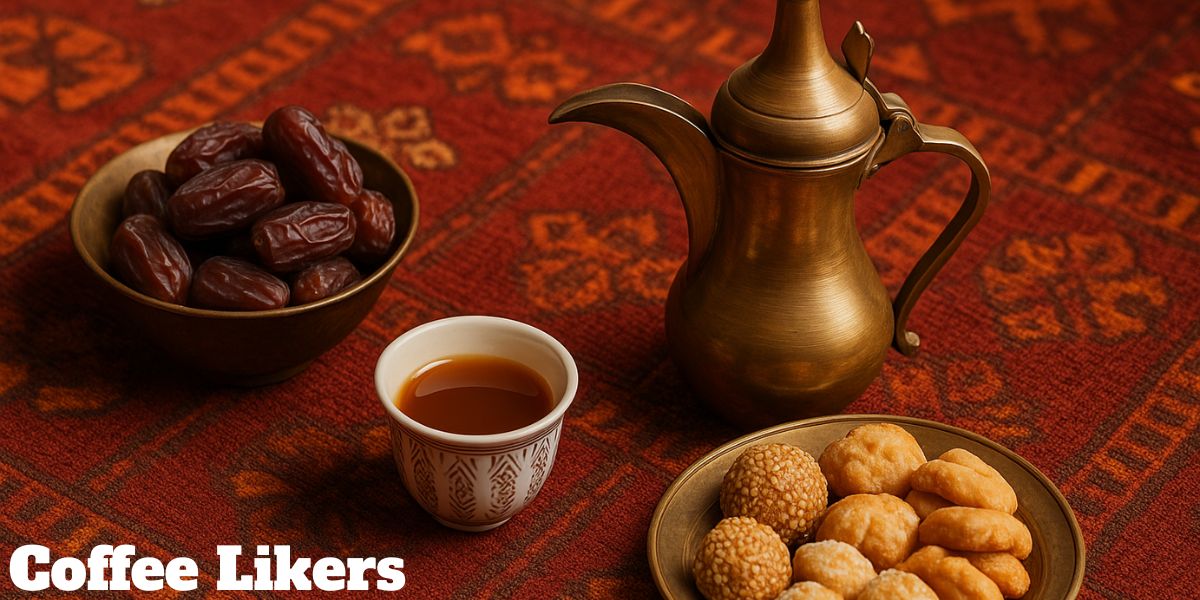Arabic coffee is a big part of Arab culture. It’s not just a drink; it represents traditions, rituals, and values passed down through many generations. This article explores the Arabic coffee culture and the interesting history of Arabic coffee.
It also explains how it is made and its role in social interactions. Arabic coffee shows why it is still important in the Arab world today.
Arabic coffee, also called qahwa, has been a symbol of hospitality and generosity in Arab culture for many years. The making and serving of Arabic coffee have specific customs that are deeply rooted in social gatherings and ceremonies.
It is often served in small cups called finjaan, with the host pouring the coffee in a continuous stream without spilling to show respect and attentiveness to their guests.
The special mix of spices, like cardamom and saffron, gives the coffee a rich and fragrant taste, making it a cherished tradition in Arab homes. Arabic coffee continues to play a big role in building connections and strengthening relationships in the modern Arab world.
What are the key elements of Arabic coffee culture? Key parts of Arabic coffee culture are explained in simple terms. There is a big emphasis on welcoming guests and relationships between individuals. They also use unique pots known as the “dallah” to serve coffee. People adhere to customary behaviors during these get-togethers.
Arabic Coffee Culture: Brief Description
Arab culture places a lot of importance on Arabic coffee, also known as “Qahwa.” It represents hospitality and kindness. It is served in a small coffee cup called a “Finjan.”
This coffee is not just a drink; it is a special experience that plays a very important role in daily life across the Arab world.
When people welcome guests or make business deals, a cup of Arabic coffee is often involved. Guests feel welcome and respected when it is done.
This rich tradition connects people from different social classes and places. It brings them together through their love for this unique beverage.
Coffee And Islamic Culture
Arabic coffee has strong links with Islamic culture. While coffee drinking started before Islam, it became well-known in the Islamic world, especially in the 15th century in Yemen.
Sufi monks drank coffee to stay awake during their nighttime prayers. From Yemen, coffee quickly spread to places like Mecca and the rest of the Ottoman Empire by the 16th century.
When Islamic holidays like Ramadan and Eid come around, Arabic coffee remains an essential part of the celebration. It shows hospitality and generosity.
Serving and sharing coffee helps build strong connections among people, creating a feeling of community and togetherness that aligns with Islamic values.
Arabian Coffee Ceremonies
Coffee in the Arab world is more than just a beverage; it is a rich cultural tradition. Serving Arabic coffee, especially in places like Saudi Arabia, is a special event filled with meaning.
It shows hospitality and generosity. When welcoming guests, hosts put great care into making the coffee. They roast the beans and grind them by hand.
The smell of fresh coffee mixed with spices, like cardamom and saffron, fills the room and makes it feel warm and inviting. Guests receive their coffee in a certain order based on their age and status. This practice emphasizes the respect and tradition that are important in Arab culture.
Middle Eastern Coffee Culture
Arabic coffee has a strong influence in the Middle East, not just in the Arabian Peninsula. Even with different styles, the focus on hospitality and social bonds stays the same.
In the Levant, people make coffee in a “rakwe,” which is a long pot, and it plays an important role in social events. Whether in busy cafes or small home gatherings, Arabic coffee helps people talk and connect.
It has a unique bitter taste, usually served without sugar, which pairs nicely with sweet treats like dates. This makes the experience of sharing coffee even better. The mix of bitter and sweet flavors reflects life, adding depth to enjoying Arabic coffee together.
Coffee And Bedouin Traditions
In the Arabian Peninsula, Arabic coffee is very important to the Bedouin communities. This drink is a part of their nomadic way of life and traditions.
In the tough desert, offering a small amount of this drink shows trust and respect. It is also a symbol of the special connection between the host and the guest.
Bedouins typically make their coffee strong and bitter. This reflects the toughness needed to survive in difficult conditions. A small cup is used to serve the coffee, which is brewed over an open fire in a “dallah.”
It provides an opportunity to relax and connect during long trips or gatherings outside. Even today, these customs continue. They remind us of the strong link between Arabic coffee and the Bedouin way of life.

History And Origins Of Arabic Coffee
The amazing smell and long history of coffee began in Ethiopia. However, it became famous because of the Arab world. Yemen became a major producer of coffee by the 15th century. Using coffee became an important part of Yemeni culture and Sufi traditions.
Coffee’s popularity spread quickly from Yemen to places like Mecca, Egypt, and the Levant. It soon became a common drink in the Middle East. By the 16th century, Arabic coffee moved beyond borders and reached Europe.
With its strong taste and energizing effects, it captured the world’s attention. Today, people around the world celebrate the heritage of Arabic coffee.
Traditional Method Of Preparing Arabic Coffee
Preparing Arabic coffee is an important tradition. It is a sensory experience that happens slowly. The wonderful smell fills the room. It all starts with green coffee beans. These are often roasted in front of guests in a flat pan.
This releases a delightful fragrance. When the beans are roasted enough, they are quickly ground. This is usually done with a mortar and pestle or a special grinder. The result is a coarse and tasty powder.
As the smell of the roasted coffee beans fills the air, the ground coffee goes into a traditional coffee pot. This pot is called a “dallah” or “cezve,” based on the area.
Then, water is added. The coffee brews slowly over a low flame. This way, the flavors develop and mix perfectly.
Importance Of Serving Arabic Coffee In Small Cups
The decision to serve Arabic coffee in small cups, known as “Finjan,” is very thoughtful. This tradition reflects important cultural values. The small cups encourage hosts to refill frequently. This allows them to show their generosity and care for their guests.
Additionally, serving a small amount of coffee places more focus on quality rather than quantity. Each sip of the strong brew should be enjoyed slowly. Coffee and spices are better able to linger on the tongue when this happens.
Taking time to savor the coffee makes conversations easier and helps build connections. A meaningful gesture is offering the first cup, then the second cup, and so on. It strengthens the bonds between everyone who is together.
Symbolism And Rituals Associated With Arabic Coffee Ceremonies
Arabic coffee ceremonies are full of symbolism. They have gestures that show deep meaning and cultural values. Offering coffee shows generosity and hospitality, welcoming everyone who is there.
The special “dallah” or “cezve” used to brew coffee often has beautiful designs. These designs represent art and heritage.
The Arabic coffee cups used are often decorated. This reflects the love for beauty and detail in Arab culture. The way coffee is poured, slowly from the dallah into the cup, is also an art. It shows grace and respect for this tradition. All these things create a rich cultural experience.
Role Of Arabic Coffee In Social Gatherings And Hospitality
In the Arab world, when people get together, they often focus on Arabic coffee. It is essential when welcoming guests, celebrating special events, or just wanting to connect.
Arabic coffee helps create a warm and friendly atmosphere. Making and serving coffee allows people to talk, share conversations, and build stronger relationships.
Despite its age, social class, and gender diversity, Arabic coffee brings people together. This coffee becomes a way for people to connect through a shared love for this cultural treasure.
Not having Arabic coffee at a gathering is considered impolite, showing how significant it is for Arabic hospitality.
Significance Of The Coffee Pot (Dallah) In Arabic Coffee Culture
In Arabic coffee culture, the traditional coffee pot is called the dallah. This pot is very important. It symbolizes hospitality and generosity. The dallah plays a central role in social events in the Arab world.
It is often beautifully designed and used to brew and serve aromatic Arabic coffee. This enhances the elegance of the coffee-drinking experience. When the dallah is present at social occasions, it shows warmth and tradition.
It reflects the deep importance of coffee in Arab societies. Overall, the dallah is a timeless symbol of the rich heritage and cherished rituals related to coffee in the Arab world.
Etiquette And Customs When Drinking Arabic Coffee
Just like making and serving Arabic coffee has its own rules, drinking it does too. It is polite to receive and hold the coffee with the right hand.
This shows respect and good manners in many Arab cultures. If someone offers you a cup of coffee, it is considered impolite to say no. This gesture means they are being friendly and welcoming.
When guests come, they usually accept at least one cup of coffee, and they might have up to three. Each cup shows a closer bond between the host and the guest.
When returning the cup to the host, a guest can shake it gently to indicate they’ve had enough. This is the polite way to decline more coffee.
Regional Variations In Arabic Coffee Preparation And Flavors
The concept of being friendly and the importance of Arabic coffee are the same in all Arab countries. Coffee is enjoyed and made differently in every place due to its unique culture.
For example, Saudi coffee usually has spices like cardamom, cloves, and saffron. In contrast, Jordanian coffee can contain ginger or cinnamon. In Yemen, the coffee is made until it is almost clear. But in the Levant, people prefer a thicker and stronger brew.
These small differences make Arabic coffee culture more interesting. They show the special traditions and flavor preferences of each country and region.
Modern Adaptations And Innovations In Arabic Coffee Culture
Arabic coffee has a strong tradition but is still changing to fit the modern world. Nowadays, you can see traditional coffee houses and trendy cafes serving Arabic coffee. These new places often use different brewing methods, such as espresso.
Big coffee chains like Starbucks have noticed the worldwide interest in Arabic coffee. They serve their versions in some areas, adding spices and flavors from traditional recipes.
This mix of old and new shows how popular Arabic coffee is and how it can connect different cultures while staying true to its roots.
Health Benefits Of Arabic Coffee Compared To Other Types Of Coffee
Arabic coffee is special because of how it’s made and the spices used in it. It may have health benefits that make it different from other types of coffee. The beans used in Arabic coffee are lightly roasted.
This gives it a lower acid level, which is easier on the stomach, especially for people with sensitive digestion.
Spices like cardamom are often added. Cardamom can help with digestion and reduce inflammation, which adds to the health benefits.
People usually drink Arabic coffee without milk or sugar. This choice can lower calorie intake and avoid the spikes in blood sugar that come from sweetened coffee.

Sustainability And Ethical Considerations In Sourcing Arabic Coffee Beans
As more people around the world want coffee, it’s also becoming important to focus on sustainability and ethics in the coffee industry. This includes how Arabic coffee is made. Many consumers now think about how their coffee choices affect the environment.
Using ethical sourcing, like fair trade certifications, helps make sure farmers get fair pay and are safe at work. When we support farms that use organic methods and reduce their impact on the planet, we help the environment.
By choosing ethically sourced Arabic coffee beans, we can enjoy our favorite drink and also support farmers and the planet.
How To Experience And Appreciate Arabic Coffee Culture Authentically
To really enjoy and understand Arabic coffee culture, you should look for real experiences that go beyond just drinking the coffee. You can connect with local people, visit traditional coffee shops, and watch the customs and social interactions around coffee. This will help you learn a lot.
Getting to know the history and meaning behind these practices will make the experience even better. If you get the chance, taking part in a traditional coffee ceremony can show you the customs and manners.
Being open to new flavors and ready to talk with locals will make your journey into Arab coffee culture much more rewarding.
FAQ About Arabic Coffee Culture
Why Is Coffee Important In Arabic Culture?
Coffee is very important in Arabic culture. It shows hospitality, generosity, and social interaction. People enjoy coffee every day and during celebrations. It helps bring the community together and creates connections among people.
What Is Special About Arabic Coffee?
Arabic coffee stands out due to its special way of making it. It uses lightly roasted beans and adds cardamom, along with other spices. This coffee is brewed without any filters, which gives it a strong and rich taste. Usually, it is served in small cups.
What Is The Traditional Arabic Coffee Called?
“Qahwa” (coffee) is the usual Arabic name for the beverage. In the Middle East, this name is widely used. It specifically talks about the traditional way of making coffee.
What Is The Etiquette For Arabic Coffee?
Arabic coffee rules say you should use your right hand to serve and accept the coffee. You should take at least one cup. If you don’t want refills, just gently shake your cup. In order to show respect to the host and the Arabic coffee traditions, it is important to pay some attention to the details.
Final Thought
A cup of Arabic coffee provides much more than caffeine. It gives you a special look at Arab culture. The way it is made and shared in social gatherings shows the kind of kindness people value.
Arabic coffee brings people together, honors customs, and shows thankfulness for the culture. Trying Arabic coffee the correct way opens up a whole world of tastes and traditions that are truly enjoyable.
The importance of Arabic coffee in social interactions cannot be ignored. It is a symbol of welcoming and friendship, and serving it is seen as a kind gesture. A traditional way of making and sharing Arabic coffee also reflects the values of generosity and respect in Arab cultures.
Every part of Arabic coffee culture, from how it is brewed to the manners around drinking it, adds to a rich collection of customs and traditions passed down through generations. In simpler terms, Arabic coffee is not just a drink, but a reflection of the values and beliefs that bring Arab communities together worldwide. Thanks for visiting Coffee Likers.





Leave a Reply